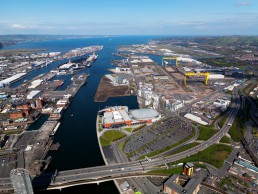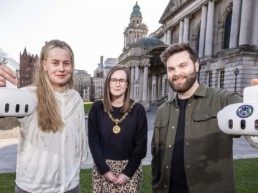The changing nature of urban economies and supply chain management, as well as an increase in online retail, has had an impact on the type and volume of goods deliveries in city centres.
This in turn has had an impact on the wider urban environment in terms of air quality, traffic management and infrastructure.
Belfast City Council is working with Dublin City Council and Enterprise Ireland on a joint €230,000 SBIR (Small Business Innovation Research) challenge to find smart, low cost solutions to optimise freight and cargo deliveries in urban centres.
Both cities aim to enhance the efficiency and effectiveness of deliveries, reducing the number of goods vehicles, which in turn will improve air quality, noise pollution and road safety.
A number of SMEs applied to the SBIR challenge in June 2018 and six received phase one funding to research and develop their proposed solution and provide a proof of concept:
Solutions include electric vehicles, mobile app controlled parking spaces, virtual parking bays, IoT technology, crowdsourced home deliveries, real-time data analytics and more efficient, consolidated deliveries.
Five of the companies – Grid Smarter Cities, Parkunload, Passel, Fernhay UPS and WeDispatch – secured phase two funding in May 2019 which will enable them to take their ideas forward to a prototyping stage in Belfast and Dublin in 2019-2020.
Projects
Parkunload is an innovative and scalable IoT (Internet of Things) platform to regulate, control and monitor loading zones, by using smart road signs, smart parking buttons and mobile apps. Parkunload’s flexible solution can manage digital parking permits and the maximum parking time depending on several criteria, such as: vehicle emissions, vehicle type and tonnage, drivers’ profile, precise location and times of the day. Find out more about this pilot trial >>
WeDispatch uses technology to improve the efficiency of delivery operations and strengthen brand-customer relationships. Their solution uses Urban Consolidation Centres (UCCs) and electric vehicles to reduce freight traffic and its impact on the environment in city centres. The UCC is used to receive large deliveries going into the city and re-distribute that delivery to electric vans, electric bicycles and possibly electric autonomous delivery vehicles. The electric vans will makes use of a Micro Hub, while the final part of the delivery is completed by electric bicycles or autonomous delivery vehicles.
Fernhay and UPS are collaboratively developing an innovative delivery hub solution that uses underutilised space in city centres, from which UPS can dispatch Fernhay’s Breathe – 4 wheeled bicycle – and Air – a powered walker. By using bikes and walkers, accessibility is opened up, allowing operators to move around the city in ways previously not possible. The project aims to reduce vans from any area it is deployed, which in turn will reduce carbon emissions, improve air quality and remove the challenge of curb side access.
Passel is the world’s first genuinely crowdsourced home delivery company; a unique service where shoppers deliver on their way home to online shoppers, providing inexpensive, convenient and delightful on-demand deliveries for retailers. Instead of professional or even part-time couriers carrying out deliveries, it will be people on their way home from the shops such as people working in the vicinity or regular shoppers. The user-friendly application service uses a combination of location awareness, predictive algorithms and behaviour analysis to enable rapid on-demand deliveries via a sharing model, reducing traffic on our streets and emissions in our air while increasing community engagement.
Grid Smarter Cities have created an eco-system of smart solutions including Kerb, a real-time, Intelligent Kerbside Management solution that allows commercial vehicle operators the ability to reserve a time slot at a defined location on previously restricted kerb space, using an intuitive app. This pre-booked space becomes a Virtual Loading Bay (VLB), allowing drivers to load and unload in close proximity to their delivery point, saving time whilst also reducing congestion, reducing air pollution and removing the risk of receiving a penalty charge notice.





